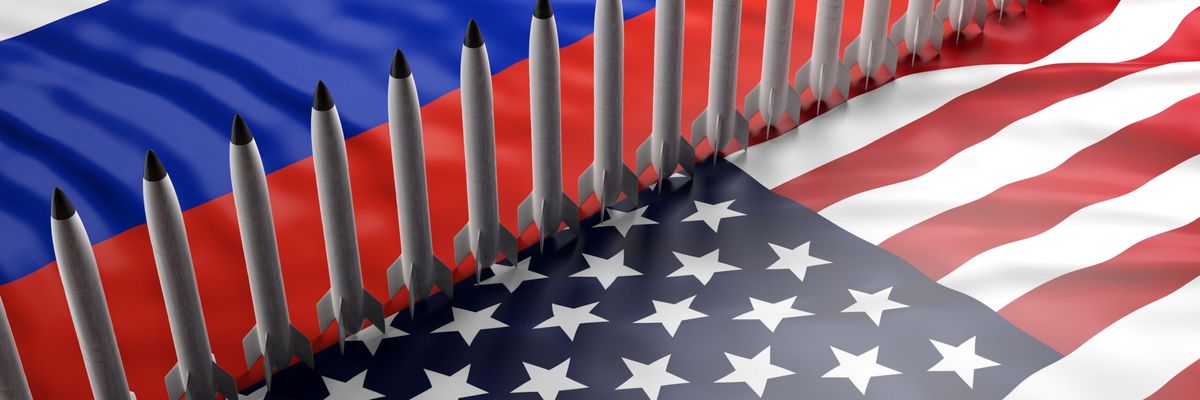Russia’s announcement on November 28 that it would postpone arms control talks with the United States was yet another signal that its current leadership is choosing a path detrimental to arms control, de-escalation, and peace.
Amid the ongoing war in Ukraine, resumption of bilateral talks and subsequent negotiations for a follow-on to the New Strategic Arms Reduction Treaty, or New START, remain a crucial avenue to maintain stability between the world’s two largest nuclear powers.
Earlier this month, the United States and Russia announced plans to once again meet under the auspices of New START’s Bilateral Consultative Commission (BCC), which last met in 2021. The treaty restricts the number of deployed strategic nuclear weapons to 1,550 each and was extended last year until 2026. The announcement raised hopes that arms control conversations would not be poisoned by Russia’s invasion.
While initially indicating that new dates would soon be announced, Russian Foreign Ministry spokesperson Maria Zakharova said that these talks could not be removed from “geopolitical realities.” This argument appears to be a nod to Russia’s real reason for postponing the talks: Its war in Ukraine has gone disastrously wrong, and Moscow seeks to pressure the United States and its allies to decrease support for Ukraine by leveraging the West’s obvious interest in the health of a treaty critical to international security. This move is yet another indication of Russia’s growing desperation due to its military failures in Ukraine — a dangerous strategy destined to fail.
To Zakharova’s point, a BCC meeting would take place within the context of certain geopolitical realities. Russian President Vladimir Putin’s rhetoric around the potential use of nuclear weapons aims to exploit fears about potential escalation to further Russian war aims. Though the saber rattling has died down recently, the mere suggestion that Russia could use nuclear weapons highlights the importance of maintaining arms control dialogue between the United States and Russia, and with all nuclear-armed states.
Arms control agreements are not just about limits on arsenals and mutual verification. They also help maintain channels of contact between would-be adversaries and preserve opportunities for de-escalation. Most bilateral and multilateral agreements include fora for discussion among the signatories as well as mechanisms to ensure mutual compliance. Examples include the Nuclear Non-Proliferation Treaty’s Review Conference, the Intermediate-Range Nuclear Forces (INF) Treaty’s Special Verification Commission, and, of course, the BCC.
Both the United States and Russia have benefited from these fora in the past. For example, at the time it was negotiated, the INF Treaty eliminated an entire class of nuclear weapons and its consultative mechanism allowed for questions about compliance to be discussed. When this was no longer effective, Russian violations led to the treaty's collapse.
In the context of the Kremlin’s war in Ukraine, both parties stand to benefit from the limits New START places on their respective nuclear forces and visibility into modernization efforts it enables through on-site inspections. Additionally, without New START, Russia may have the most to lose in a renewed arms race, considering a renewed arms build-up would likely involve the United States as well as China.
Russia’s recent military setbacks and loss of skilled workers due to the war hinder its ability to compete in a future arms race. Reporting suggests some 350,000 people have fled Russia following the mobilization order to bolster dwindling army ranks. Internal Russian reports suggest fears of sanctions negatively affecting long-term growth. According to the Organization for Economic Co-operation and Development, the Russian economy may contract by 3.9 percent this year and 5.6 percent next year. While not catastrophic, this trend is worrisome in the long term and shows Russia’s weakened position as a world power. Russia’s flailing invasion of Ukraine and current position in the ongoing war continues to capture international attention, which Russia would undoubtedly like to deflect.
Russian Deputy Foreign Minister Sergei Ryabkov blamed the postponement of the talks on U.S. officials’ unwillingness to take “Russian priorities” into account. Ryabkov further claimed the United States was only interested in restarting on-site inspections and unwilling to discuss specifics about the weapons count under New START. Unsurprisingly, this is a red herring from the Kremlin. On-site inspections, which have been paused since the beginning of the COVID-19 pandemic, are not contingent on a BCC meeting and could be restarted without one. The issues cited by Ryabkov about weapons counts, however, would be among those normally covered at a BCC — thus, if weapons counts were Russia’s real issue, the Kremlin would want a BCC meeting.
As other voices have pointed out, the clock for New START is undeniably ticking. Given the state of Russia’s economy, its military losses, and international isolation, it would benefit Russian leadership to rethink its current approach to arms control and reinvest in New START, before the clock runs out.















